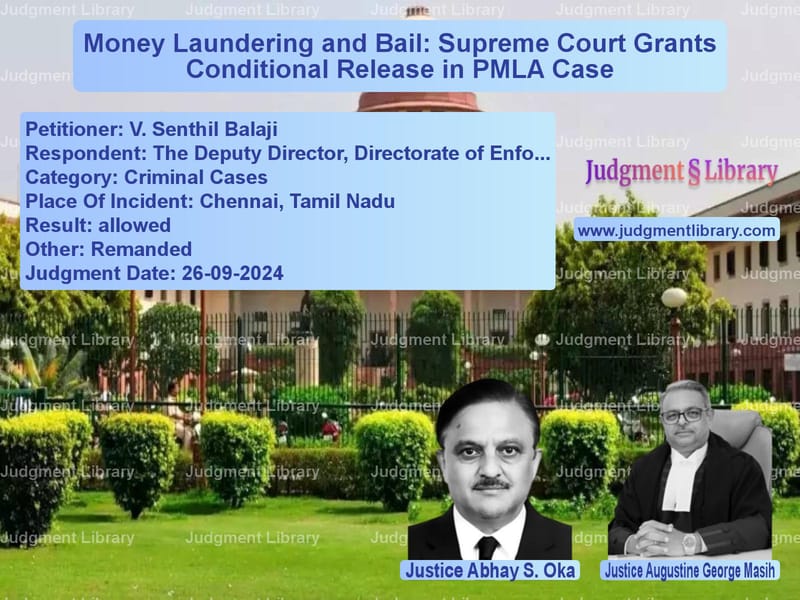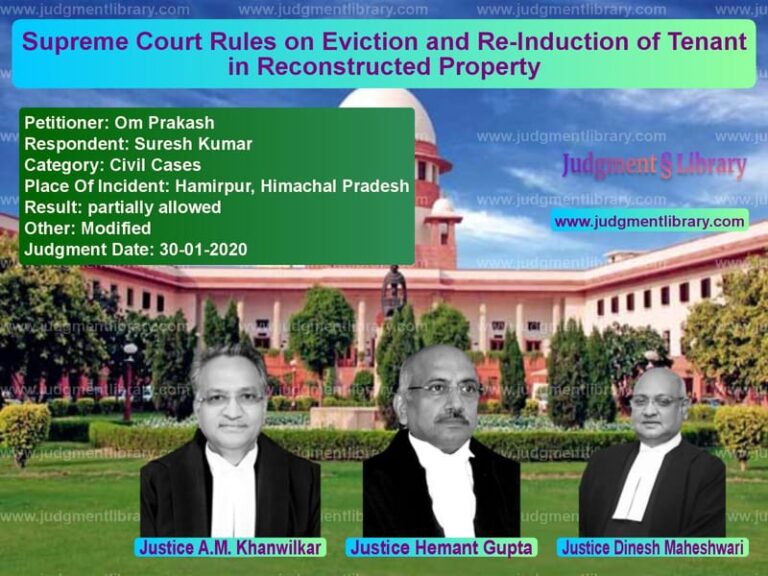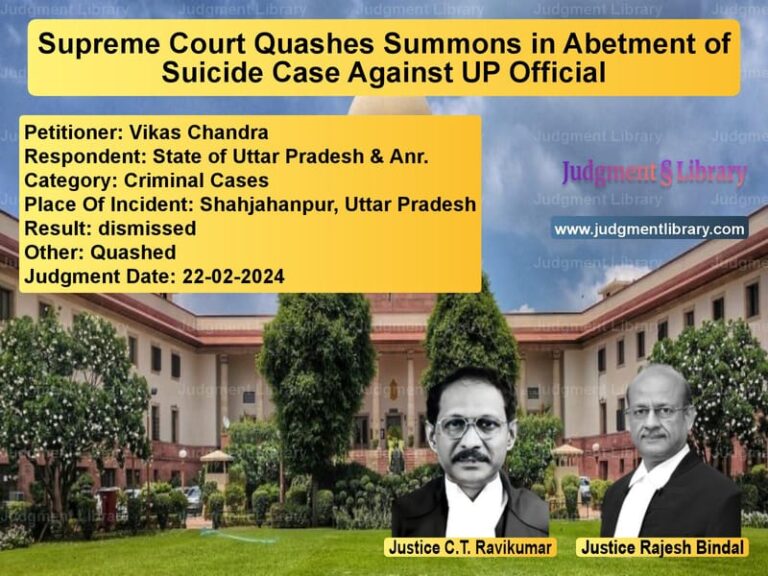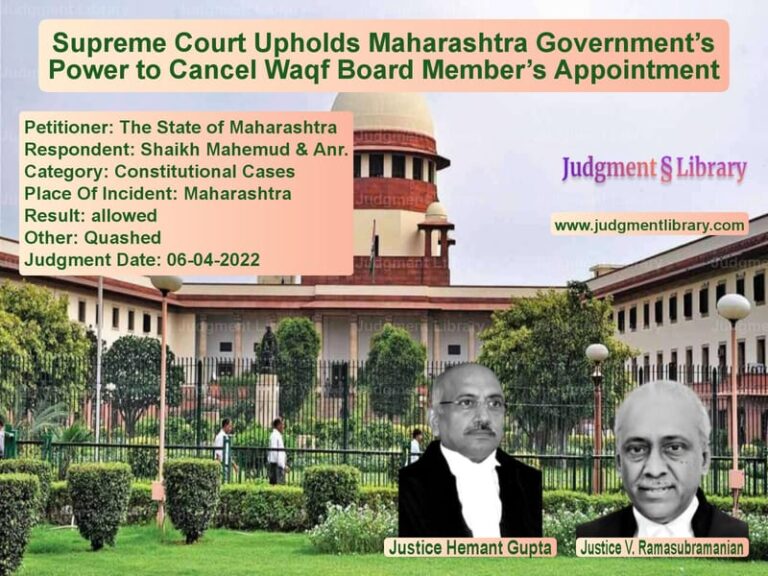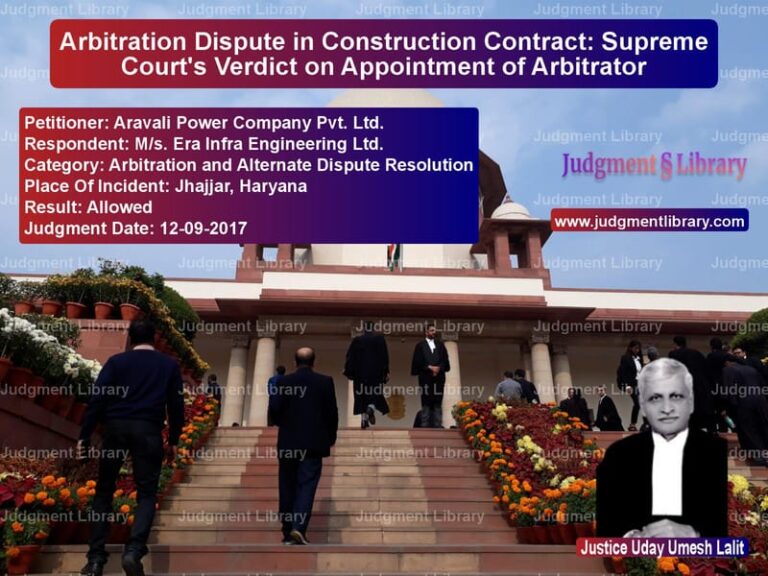Money Laundering and Bail: Supreme Court Grants Conditional Release in PMLA Case
The case of V. Senthil Balaji vs. The Deputy Director, Directorate of Enforcement concerns a high-profile money laundering case linked to alleged job fraud during the tenure of the appellant as the Transport Minister of Tamil Nadu. The Supreme Court granted bail to the appellant, citing the prolonged period of incarceration and the unlikelihood of an early trial conclusion.
Background of the Case
The appellant, V. Senthil Balaji, served as the Transport Minister in Tamil Nadu between 2011 and 2016. During this period, he was accused of collecting money from individuals in exchange for job appointments in various positions in the Transport Department. The case led to the registration of multiple FIRs:
- FIR No. 441 of 2015 (CC Nos. 22 and 24 of 2021) – More than 2000 accused were named, and 550 witnesses were cited.
- FIR No. 298 of 2017 (CC No. 19 of 2020) – 14 accused and 24 witnesses.
- FIR No. 344 of 2018 (CC No. 25 of 2020) – 24 accused and 50 witnesses.
Based on these cases, the Enforcement Directorate (ED) registered an Enforcement Case Information Report (ECIR) No. MDSZO/21/2021 on July 29, 2021, under Section 3 of the Prevention of Money Laundering Act, 2002 (PMLA), which is punishable under Section 4 of the Act.
Key Legal Issues
- Was there sufficient material to deny bail to the appellant?
- Could the trial for money laundering proceed without the conclusion of the predicate offences?
- Was the prolonged incarceration of the appellant in violation of his fundamental rights?
Arguments by the Appellant
The appellant’s senior counsel presented the following arguments:
- The ED relied on material collected by investigating agencies in the scheduled offences without independent evidence.
- A file named “CS AC” allegedly containing job-related bribes was found in a seized pen drive. However, forensic analysis revealed only a file named “csac.xlsx,” casting doubt on its authenticity.
- The cash deposit of Rs. 1.34 crores in the appellant’s bank account was claimed to be from his MLA remuneration and agricultural income.
- The trial of the scheduled offences had not even begun, and with over 2000 accused and 600 witnesses, the trial was unlikely to conclude within the next 5–6 years.
- The appellant had already spent over 14 months in jail, and continued incarceration would amount to punishment without trial.
Arguments by the Enforcement Directorate
The ED countered the bail plea with the following arguments:
- The file “CS AC” found in the pen drive contained details of Rs. 67.74 crores collected for job placements in the Transport Department.
- The appellant had been a Minister for several years and wielded significant influence, which could be used to tamper with evidence.
- The bank deposits and cash flow analysis did not support the appellant’s claim that the funds were from legitimate sources.
- Electronic evidence, emails, and records showed clear involvement in the job scam.
- The high-profile nature of the case required stringent application of PMLA provisions to prevent misuse of the system.
Supreme Court’s Observations
1. Prolonged Incarceration and Right to Speedy Trial
The Court emphasized that undertrials should not be indefinitely detained:
“The appellant has already undergone incarceration under the PMLA for more than 15 months, and there is no possibility of trial concluding within a reasonable timeframe.”
2. Applicability of the Twin Conditions in Section 45 of PMLA
The Court considered the conditions required for granting bail under PMLA:
“While the twin conditions for bail under Section 45 of the PMLA are strict, they cannot override the fundamental right to liberty under Article 21 of the Constitution.”
3. Strength of Prosecution’s Evidence
The Court noted that while there was evidence against the appellant, prolonged detention without trial could not be justified:
“Even if the allegations are serious, they must be tried expeditiously. Mere allegations cannot justify indefinite imprisonment.”
4. Conditions for Bail
The Court granted bail but imposed stringent conditions:
- The appellant must furnish bail bonds worth Rs. 25,00,000/- with two sureties.
- He must not contact or communicate with prosecution witnesses.
- He must report to the ED office every Monday and Friday.
- He must surrender his passport.
- He must attend all court hearings without fail.
Final Judgment
The Supreme Court allowed the appeal and granted conditional bail:
“The appeal is allowed. The appellant shall be released on bail till the final disposal of the trial, subject to strict conditions to ensure he does not interfere with the legal proceedings.”
Impact of the Judgment
This ruling has significant implications for PMLA cases and bail jurisprudence:
- Prolonged pre-trial detention should not be used as punishment: Courts must ensure that undertrials are not detained indefinitely.
- Stringent conditions can balance liberty and prosecution concerns: Bail can be granted with conditions to prevent evidence tampering.
- PMLA trials must be expedited: The judgment reinforces the need for faster trial processes in money laundering cases.
- Electronic evidence must be scrutinized: The Court’s analysis of forensic inconsistencies highlights the importance of evidence integrity.
This judgment underscores the principle that criminal prosecution must be fair, ensuring both the rights of the accused and the integrity of legal proceedings.
Petitioner Name: V. Senthil Balaji.Respondent Name: The Deputy Director, Directorate of Enforcement.Judgment By: Justice Abhay S. Oka, Justice Augustine George Masih.Place Of Incident: Chennai, Tamil Nadu.Judgment Date: 26-09-2024.
Don’t miss out on the full details! Download the complete judgment in PDF format below and gain valuable insights instantly!
Download Judgment: v.-senthil-balaji-vs-the-deputy-director,-supreme-court-of-india-judgment-dated-26-09-2024.pdf
Directly Download Judgment: Directly download this Judgment
See all petitions in Money Laundering Cases
See all petitions in Bail and Anticipatory Bail
See all petitions in Fraud and Forgery
See all petitions in Judgment by Abhay S. Oka
See all petitions in Judgment by Augustine George Masih
See all petitions in allowed
See all petitions in Remanded
See all petitions in supreme court of India judgments September 2024
See all petitions in 2024 judgments
See all posts in Criminal Cases Category
See all allowed petitions in Criminal Cases Category
See all Dismissed petitions in Criminal Cases Category
See all partially allowed petitions in Criminal Cases Category

